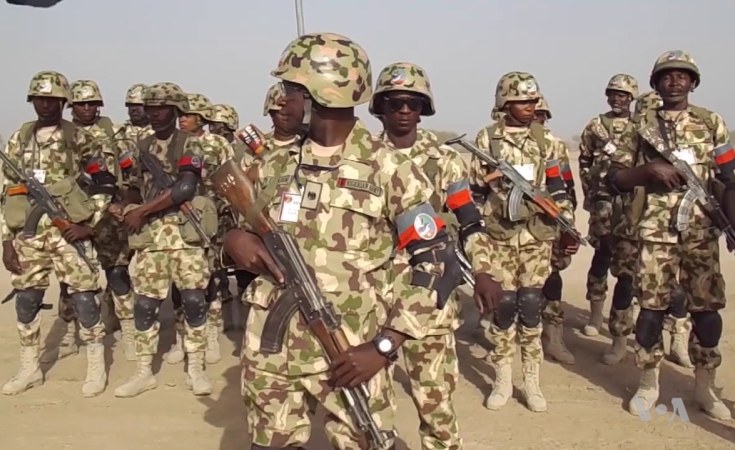West African leaders say they will meet on Thursday to discuss the crisis in Niger after the country's military rulers defied a deadline to reinstate the ousted president or face a possible military intervention.
The Economic Community of West African States (ECOWAS) said it would hold an extraordinary summit Thursday in Abuja, the capital of neighboring Nigeria, according to spokesperson Emos Lungu.
After the ECOWAS deadline passed Sunday for Niger's military to stand down and restore President Mohammed Bazoum, military leaders there issued a pledge to defend the country and closed Niger's airspace.
"Niger's armed forces and all our defense and security forces, backed by the unfailing support of our people, are ready to defend the integrity of our territory," a junta representative said in a statement on national television.
The spokesman said any attempt to fly over the country will be met with "an energetic and immediate response."
International airlines have begun to divert flights around Niger's airspace. The United Nations said its humanitarian flights have also been grounded because of the closed airspace.
Also Monday, neighboring Mali said it and Burkina Faso would send a delegation of officials to Niger to show support for the military rulers.
Both countries - which have fallen to military coups in recent years - have said military intervention in Niger would be tantamount to a declaration of war.
On Friday, West African defense chiefs drew up a plan for a possible military intervention in Niger if the country's military leaders did not release and reinstall President Bazoum.
"All the elements that will go into any eventual intervention have been worked out here, including the resources needed, the how and when we are going to deploy the force," Abdel-Fatau Musah, Economic Community of West African States commissioner for political affairs, peace and security, said Friday.
The 15-nation bloc has sent military forces into member states in the past. However, it is not clear if ECOWAS members will support military action in Niger to resolve the current crisis.
Nigeria's Senate urged the bloc to focus on political and diplomatic options instead of the use of force.
Italy urged ECOWAS to extend the deadline for the Niger's military leaders back down and called for a diplomatic solution.
"A solution must be found. It's not set that there is no way other than war," Italian Foreign Minister Antonio Tajani told La Stampa newspaper.
Niger's military rulers have not shown much interest in negotiating.
An ECOWAS diplomatic delegation that arrived in Niger's capital, Niamey, on Thursday ended up leaving without meeting junta chief General Abdourahamane Tchiani or Bazoum.
U.N. Secretary-General António Guterres reiterated Monday his "full support to ECOWAS' ongoing mediation efforts," and expressed concern over the continued detention of Bazoum and the failure so far to restore constitutional order in Niger, according to a U.N. spokesperson.
The coup has been widely condemned by the African Union, Western governments and the United Nations. U.S. President Joe Biden called Thursday for Bazoum's immediate release, adding that Niger is "facing a grave challenge to its democracy."
The U.S. paused some aid programs that benefited the government of Niger, Secretary of State Antony Blinken said in a statement on Friday. But he said humanitarian and food aid would continue.
The State Department said Monday the paused aid is valued at more than $100 million and includes development assistance, security assistance and law enforcement assistance.
State Department spokesperson Matthew Miller said "hundreds of millions of dollars" in U.S. assistance is at stake if Niger's military leaders do not reinstate the elected government.
He said U.S. officials are still able to communicate with Bazoum and that their most recent contact was Monday. Miller also said there has also been direct U.S. contact with Niger military leaders, urging them to step aside.
Bazoum, who has been under house arrest with his family since July 26, described himself in a Washington Post column Thursday as a "hostage," and warned that if the mutiny proved successful, "it will have devastating consequences for our country, our region and the entire world."
He called on "the U.S. government and the entire international community to help us restore our constitutional order."
On July 26, Tchiani, the former head of Niger's presidential guard, declared himself the country's new leader, saying the power grab was necessary because of ongoing insecurity in the country caused by an Islamist insurgency.
Niger has been a partner in the fight against counterterrorism in the Sahel, where militants linked to al-Qaida and Islamic State are operating. Both the United States and France have troops in Niger focused on counterterror operations.
Last week, Niger's military leaders read a decision on national television ending bilateral military agreements with France, Niger's former colonial ruler.
It is not clear what will happen to the French military presence consisting of 1,500 troops or the 1,000 U.S. military personnel in the country.
Some information in this report came from The Associated Press, Agence France-Presse and Reuters.


